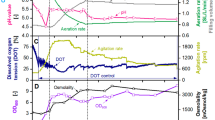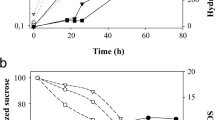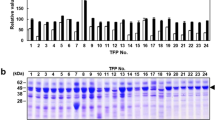Abstract
The growing consumer demand for low-calorie, sugar-free foodstuff motivated us to search for alternative non-nutritive sweeteners. A promising sweet-tasting compound is 5-keto-d-fructose (5-KF), which is formed by membrane-bound fructose dehydrogenases (Fdh) in some Gluconobacter strains. The plasmid-based expression of the fdh genes in Gluconobacter (G.) oxydans resulted in a much higher Fdh activity in comparison to the native host G. japonicus. Growth experiments with G. oxydans fdh in fructose-containing media indicated that 5-KF was rapidly formed with a conversion efficiency of 90%. 5-KF production from fructose was also observed using resting cells with a yield of about 100%. In addition, a new approach was tested for the production of the sweetener 5-KF by using sucrose as a substrate. To this end, a two-strain system composed of the fdh-expressing strain and a G. oxydans strain that produced the sucrose hydrolyzing SacC was developed. The strains were co-cultured in sucrose medium and converted 92.5% of the available fructose units into 5-KF. The glucose moiety of sucrose was converted to 2-ketogluconate and acetate. With regard to the development of a sustainable and resource-saving process for the production of 5-KF, sugar beet extract was used as substrate for the two-strain system. Fructose as product from sucrose cleavage was mainly oxidized to 5-KF which was detected in a concentration of over 200 mM at the end of the fermentation process. In summary, the two-strain system was able to convert fructose units of sugar beet extract to 5-KF with an efficiency of 82 ± 5%.





Similar content being viewed by others
References
Ameyama M, Shinagawa E, Matsushita K, Adachi O (1981) D-fructose dehydrogenase of Gluconobacter industrius. Purification, characterization, and application to enzymatic microdetermination of D-fructose. J Biotechnol 145:814–823
Ano Y, Hours RA, Akakabe Y, Kataoka N, Yakushi T, Matsushita K, Adachi O (2017) Membrane-bound glycerol dehydrogenase catalyzes oxidation of D-pentonates to 4-keto-D-pentonates, D-fructose to 5-keto-D-fructose, and D-psicose to 5-keto-D-psicose. Biosci Biotech Bioch 81(2):411–418. https://doi.org/10.1080/09168451.2016.1254535
Aragno M, Mastrocola R (2017) Dietary sugars and endogenous formation of advanced glycation endproducts: emerging mechanisms of disease. Nutrients 9(4):385. https://doi.org/10.3390/nu9040385
Barbe JC, De Revel G, Joyeux A, Bertrand A, Lonvaud-Funel A (2001) Role of botrytized grape micro-organisms in SO2 binding phenomena. J Appl Microbiol 90(1):34–42. https://doi.org/10.1046/j.1365-2672.2001.01200.x
Bidwell AJ (2017) Chronic fructose ingestion as a major health concern: is a sedentary lifestyle making it worse? Nutrients 9(6):549. https://doi.org/10.3390/nu9060549
Blanchard JS, Brewer CF, Englard S, Avigad G (1982) Solution structure of 5-keto-D-fructose: relevance to the specificity of hexose kinases. Biochemistry-US 21(1):75–81. https://doi.org/10.1021/bi00530a014
Blasi M, Barbe JC, Dubourdieu D, Deleuze H (2008) New method for reducing the binding power of sweet white wines. J Agr Food Chem 56(18):8470–8474. https://doi.org/10.1021/jf800665e
Bradford MM (1976) A rapid and sensitive method for the quantitation of microgram quantities of protein utilizing the principle of protein–dye binding. Anal Biochem 72(1-2):248–254. https://doi.org/10.1016/0003-2697(76)90527-3
Chung M, Ma J, Patel K, Berger S, Lau J, Lichtenstein AH (2014) Fructose, high-fructose corn syrup, sucrose, and nonalcoholic fatty liver disease or indexes of liver health: a systematic review and meta-analysis. Am J Clin Nutr 100(3):833–849. https://doi.org/10.3945/ajcn.114.086314
De Azevedo LC, Reis MM, Motta LF, Rocha GOD, Silva LA, de Andrade JB (2007) Evaluation of the formation and stability of hydroxyalkylsulfonic acids in wines. J Agr Food Chem 55(21):8670–8680. https://doi.org/10.1021/jf0709653
De Ley J, Gillis M, Swings J (1984) The genus Gluconobacter. In: Krieg NR, Holt JG (eds) Bergey’s manual of systematic bacteriology, vol 1. Williams and Wilkins, Baltimore, pp 267–278
Deppenmeier U, Ehrenreich A (2009) Physiology of acetic acid bacteria in light of the genome sequence of Gluconobacter oxydans. J Mol Microb Biotech 16:69–80
Englard S, Avigad G (1965) 5-keto-d-fructose. II. Patterns of formation and of associated dehydrogenase activities in Gluconobacter cerinus. J Biol Chem 240:2297–2310
Hanover LM, White JS (1993) Manufacturing, composition, and applications of fructose. Am J Clin Nutr 58(5 Suppl):724S–732S
Hyvönen L, Koivistoinen P, Voirol F (1982) Food technological evaluation of xylitol. Adv Food Res 28:373–403. https://doi.org/10.1016/S0065-2628(08)60114-7
Ikeda T, Matsushita F, Senda M (1990) D-fructose dehydrogenase-modified carbon paste electrode containing para-benzoquinone as a mediated amperometric fructose sensor. Agr Biol Chem Tokyo 54:2919–2924
Johnson RJ, Segal MS, Sautin Y, Nakagawa T, Feig DI, Kang DH, Gersch MS, Benner S, Sánchez-Lozada LG (2007) Potential role of sugar (fructose) in the epidemic of hypertension, obesity and the metabolic syndrome, diabetes, kidney disease, and cardiovascular disease. Am J Clin Nutr 86(4):899–906
Kallnik V, Meyer M, Deppenmeier U, Schweiger P (2010) Construction of expression vectors for protein production in Gluconobacter oxydans. J Biotechnol 150(4):460–465. https://doi.org/10.1016/j.jbiotec.2010.10.069
Kataoka N, Matsutani M, Yakushi T, Matsushita K (2015) Efficient production of 2,5-diketo-D-gluconate via heterologous expression of 2-ketogluconate dehydrogenase in Gluconobacter japonicus. Appl Environ Microb 81(10):3552–3560. https://doi.org/10.1128/AEM.04176-14
Kawai S, Goda-Tsutsumi M, Yakushi T, Kano K, Matsushita K (2013) Heterologous overexpression and characterization of a flavoprotein-cytochrome c complex fructose dehydrogenase of Gluconobacter japonicus NBRC3260. Appl Environ Microb 79(5):1654–1660. https://doi.org/10.1128/AEM.03152-12
Klasen R, Bringer-Meyer S, Sahm H (1995) Biochemical characterization and sequence analysis of the gluconate:NADP 5-oxidoreductase gene from Gluconobacter oxydans. J Bacteriol 177(10):2637–2643. https://doi.org/10.1128/jb.177.10.2637-2643.1995
Koizumi N, Fujii M, Ninomiya R, Inoue Y, Kagawa T, Tsukamoto T (1983) Studies on transitory laxative effects of sorbitol and maltitol I: estimation of 50% effective dose and maximum non-effective dose. Chemosphere 12(1):45–53. https://doi.org/10.1016/0045-6535(83)90178-9
Kosciow K, Zahid N, Schweiger P, Deppenmeier U (2014) Production of a periplasmic trehalase in Gluconobacter oxydans and growth on trehalose. J Biotechnol 189:27–35. https://doi.org/10.1016/j.jbiotec.2014.08.029
Kosciow K, Domin C, Schweiger P, Deppenmeier U (2016) Extracellular targeting of an active endoxylanase by a TolB negative mutant of Gluconobacter oxydans. J Ind Microbiol Biot 43(7):989–999. https://doi.org/10.1007/s10295-016-1770-6
Kovach ME, Elzer PH, Hill DS, Robertson GT, Farris MA, Roop RM, Peterson KM (1995) Four new derivatives of the broad-host-range cloning vector pBBR1MCS, carrying different antibiotic-resistance cassettes. Gene 166(1):175–176. https://doi.org/10.1016/0378-1119(95)00584-1
Laemmli UK (1970) Cleavage of structural proteins during the assembly of the head of bacteriophage T4. Nature 227(5259):680–685. https://doi.org/10.1038/227680a0
Levering PR, Weenk G, Olijve W, Dijkhuizen L, Harder W (1988) Regulation of gluconate and ketogluconates production in Gluconobacter oxydans ATCC-621-H. Arch Microbiol 149(6):534–539. https://doi.org/10.1007/BF00446757
Longley RP, Perlman D (1972) Conversion of L-sorbose to 5-keto-D-fructose by pseudomonads. Biotechnol Bioeng 14(5):843–846. https://doi.org/10.1002/bit.260140513
Macdonald IA (2016) A review of recent evidence relating to sugars, insulin resistance and diabetes. Eur J Nutr 55(S2):17–23. https://doi.org/10.1007/s00394-016-1340-8
Malik VS, Popkin BM, Bray GA, Després JP, Willett WC, FB H (2010) Sugar-sweetened beverages and risk of metabolic syndrome and type 2 diabetes. Diabetes Care 33(11):2477–2483. https://doi.org/10.2337/dc10-1079
Matsumoto K, Hamada O, Ukeda H, Osajima Y (1986) Amperometric flow-injection determination of fructose with an immobilized fructose 5-dehydrogenase reactor. Anal Chem 58(13):2732–2734. https://doi.org/10.1021/ac00126a033
Matsushita K, Shinagawa E, Adachi O, Ameyama M (1989) Reactivity with ubiquinone of quinoprotein D-glucose dehydrogenase from Gluconobacter suboxydans. J Biochem 105(4):633–637. https://doi.org/10.1093/oxfordjournals.jbchem.a122716
Matsushita K, Toyama H, Adachi O (1994) Respiratory chains and bioenergetics of acetic acid bacteria. Adv Microb Physiol 36:247–301. https://doi.org/10.1016/S0065-2911(08)60181-2
Meyer M, Schweiger P, Deppenmeier U (2013) Effects of membrane-bound glucose dehydrogenase overproduction on the respiratory chain of Gluconobacter oxydans. Appl Microbiol Biot 97(8):3457–3466. https://doi.org/10.1007/s00253-012-4265-z
Miller JH (1972) Assay of β-galactosidase. In: Miller JH (ed) Experiments in molecular genetics. Cold Spring Harbor Laboratory Press, New York, pp 352–355
Mostafa HE, Heller KJ, Geis A (2002) Cloning of Escherichia coli lacZ and lacY genes and their expression in Gluconobacter oxydans and Acetobacter liquefaciens. Appl Environ Microb 68(5):2619–2623. https://doi.org/10.1128/AEM.68.5.2619-2623.2002
Murata K, Suzuki M, Nakamura N, Ohno H (2009) Direct evidence of electron flow via the heme c group for the direct electron transfer reaction of fructose dehydrogenase using a silver nanoparticle-modified electrode. Electrochem Commun 11(8):1623–1626. https://doi.org/10.1016/j.elecom.2009.06.012
Oku T, Okazaki M (1996) Laxative threshold of sugar alcohol erythritol in human subjects. Nutr Res 16(4):577–589. https://doi.org/10.1016/0271-5317(96)00036-X
Olijve W, Kok JJ (1979) Analysis of growth of Gluconobacter oxydans in glucose-containing media. Arch Microbiol 121(3):283–290. https://doi.org/10.1007/BF00425069
O'Mullan PJ, Chase T, Eveleigh DE (1992) Purification and some properties of extracellular invertase B from Zymomonas mobilis. Appl Microbiol Biot 38:341–346
Pollock NK, Bundy V, Kanto W, Davis CL, Bernard PJ, Zhu HD, Gutin B, Dong YB (2012) Greater fructose consumption is associated with cardiometabolic risk markers and visceral adiposity in adolescents. J Nutr 142(2):251–257. https://doi.org/10.3945/jn.111.150219
Rauch B, Pahlke J, Schweiger P, Deppenmeier U (2010) Characterization of enzymes involved in the central metabolism of Gluconobacter oxydans. Appl Microbiol Biot 88(3):711–718. https://doi.org/10.1007/s00253-010-2779-9
Reichstein T, Grüssner A (1934) Eine ergiebige Synthese der 1-Ascorbinsäure (C-Vitamin). Helv Chim Acta 17(1):311–328. https://doi.org/10.1002/hlca.19340170136
Reinefeld E (1996) Rübenzucker. In: Heiss R (ed) Lebensmitteltechnologie. Springer, Berlin and Heidelberg, pp 251–261. https://doi.org/10.1007/978-3-642-97655-1_30
Richhardt J, Bringer S, Bott M (2012) Mutational analysis of the pentose phosphate and Entner-Doudoroff pathways in Gluconobacter oxydans reveals improved growth of a Δedd Δeda mutant on mannitol. Appl Environ Microb 78(19):6975–6986. https://doi.org/10.1128/AEM.01166-12
Rippe JM, Angelopoulos TJ (2016) Relationship between added sugars consumption and chronic disease risk factors: current understanding. Nutrients 8:1–19
Schedel M (2000) Regioselective oxidation of aminosorbitol with Gluconobacter oxydans, key reaction in the industrial 1-deoxynojirimycin synthesis. In: Kelly DR. In: Biotechnology, vol 8b. Wiley-VCH, Weinheim, pp 295–308. https://doi.org/10.1002/9783527620913.ch7
Schiweck H (1983) Zucker, Rüben-und Rohr. In: Bartholomé E, Biekert E, Hellmann H, Ley H, Weigert W, Weise E (eds) Ullmanns Enzyklopädie der Technischen Chemie. Wiley-VCH, Weinheim, pp 703–748
Sumner JB, Graham VA (1921) Dinitrosalicylic acid: a reagent for the estimation of sugar in normal and diabetic urine. J Biol Chem 47:5–9
Terada O, Suzuki S, Kinoshita S (1961) Occurrence of 5-ketofructose during kojic acid formation from sorbose by Acetobacter species. Agr Biol Chem Tokyo 25(11):871–872. https://doi.org/10.1080/00021369.1961.10857892
Towbin H, Staehelin T, Gordon J (1979) Electrophoretic transfer of proteins from polyacrylamide gels to nitrocellulose sheets: procedure and some applications. P Natl Acad Sci USA 76(9):4350–4354. https://doi.org/10.1073/pnas.76.9.4350
Trivedi UB, Lakshminarayanaa D, Kothari IL, Patel PB, Panchalc CJ (2008) Amperometric fructose biosensor based on fructose dehydrogenase enzyme. Sensor Actuat B-Chem 136:45–51
Vuilleumier S (1993) Worldwide production of high-fructose syrup and crystalline fructose. Am J Clin Nutr 58(5 Suppl):733S–736S
Whitehouse CR, Boullata J, McCauley LA (2008) The potential toxicity of artificial sweeteners. AAOHN J 56(6):251–261. https://doi.org/10.3928/08910162-20080601-02
Wyrobnik DH, Wyrobnik IH, Silcoff ER (2009) Agent for reducing the useable calorie content of food and for therapeutic reduction of weight, in particular for use in the case of adiposity (obesity). Patent application no. US020130236593A1
Wyse R (1979) Sucrose uptake by sugar beet tap root tissue. Plant Physiol 64(5):837–841. https://doi.org/10.1104/pp.64.5.837
Zeiser J, Mühlenbeck LH, Schweiger P, Deppenmeier U (2013) Characterization of a periplasmic quinoprotein from Sphingomonas wittichii that functions as aldehyde dehydrogenase. Appl Microbiol Biot 98:2067–2079
Acknowledgements
This project was supported by funds from NRW-Strategy project BioSC (project GLUFACT) and from Bundesministerium für Bildung und Forschung (BMBF, project no. 031B0370A). We thank Elisabeth Schwab and Juliane Hoffmann for technical assistance, Dr. S. Kehraus of the Institute of Pharmaceutical Biology Bonn for the 13C NMR spectroscopy analysis, and Dr. P. Kasten of the Rheinischer Rübenbauer-Verband e.V. for the provision of sugar beet plants.
Author information
Authors and Affiliations
Corresponding author
Ethics declarations
Conflict of interest
The authors declare that they have no conflict of interest.
Ethical statement
Authors affirm that the said publication complies with obligations and norms of the ethical standards of research.
Electronic supplementary material
ESM 1
(PDF 871 kb)
Rights and permissions
About this article
Cite this article
Siemen, A., Kosciow, K., Schweiger, P. et al. Production of 5-ketofructose from fructose or sucrose using genetically modified Gluconobacter oxydans strains. Appl Microbiol Biotechnol 102, 1699–1710 (2018). https://doi.org/10.1007/s00253-017-8699-1
Received:
Revised:
Accepted:
Published:
Issue Date:
DOI: https://doi.org/10.1007/s00253-017-8699-1




